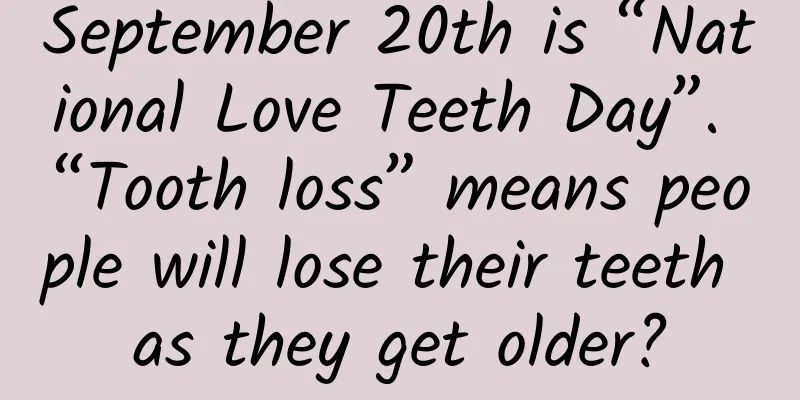September 20th is “National Love Teeth Day”. “Tooth loss” means people will lose their teeth as they get older?

|
Wang Min September 20th is the 36th "National Love Teeth Day". This year's event is themed "Oral health, whole body health" and the sub-theme is "Protecting throughout the life cycle, let health start with 'teeth'." Is tooth loss really due to aging? In our daily life, we often say "old people lose their teeth", and we think that old people will definitely lose their teeth. But is tooth loss really due to "old age"? The World Health Organization once proposed the "8020 Plan", the purpose of which is to ensure health and improve the quality of life by extending the life of teeth. If you can protect your teeth, you can have 20 teeth by the age of 80. What are the causes of tooth loss? In fact, tooth loss has no direct relationship with age. The main reasons for tooth loss are as follows. One is caries, which is what we often call "cavities". If caries are not treated in time, they will gradually develop into residual roots and crowns, and can only be extracted when they cannot be treated. The third is physiological degenerative changes. As people age, their teeth are prone to physiological degenerative changes in the periodontal tissues, which can also cause tooth loss. How to slow down tooth loss in aging On the one hand, doctors will recommend that you have regular oral examinations and clean your teeth 1-2 times a year. During the cleaning process, doctors will promptly deal with some minor problems, such as filling smaller cavities in time to prevent them from further developing and causing tooth loss. On the other hand, the most effective way to treat periodontal disease is still regular periodontal cleaning. As long as we maintain daily oral hygiene, even if periodontal disease shows early symptoms such as bleeding gums, red and swollen gums, it is controllable. If it has developed into periodontitis, in addition to regular periodontal gingival cleaning, we also need to perform subgingival scaling and even periodontal flap surgery to control inflammation and retain the affected teeth. For teeth that have been lost, they should be repaired as soon as possible. Of course, brushing your teeth carefully is the top priority. It is recommended to use dental floss, interdental brushes, and water flossers to reduce the retention of plaque between teeth. How to brush your teeth correctly The Bass brushing method, also known as the gingival sulcus cleaning method or the horizontal vibration method, is an effective method for removing plaque near the gingival margin and in the gingival sulcus. It is recommended that you choose a soft-bristled toothbrush and point the toothbrush at a 45° angle to the long axis of the tooth toward the root apex, so that part of the bristles enter the gingival sulcus and part of the bristles are spread on the gingival edge, and extend into the gap between adjacent teeth as much as possible. Use gentle pressure to make the bristles vibrate horizontally in the front-to-back direction 4-5 times. When vibrating, the toothbrush moves only about 1 mm, brush 2-3 teeth each time, and then move the toothbrush to the next group of teeth, and pay attention to overlapping. Why do teeth still turn yellow even though I brush them every day? Healthy teeth are naturally light yellow, and the outer layer of tooth enamel is well calcified and translucent, revealing the yellow dentin inside. If the color of your teeth is darker than light yellow, it may be caused by the following reasons. The first is endogenous staining. Especially for children under 8 years old, taking tetracycline drugs during the period of tooth development can cause tooth discoloration; some people living in mountainous areas can cause tooth discoloration by drinking water with high fluoride content for a long time; some bacteria can also cause caries and discolor the tooth surface. The second is exogenous pigmentation. When people eat foods and drinks containing pigments (coffee, tea, red wine, cola), or smoke for a long time, these pigments will adhere to the surface of the teeth and discolor the teeth. What are some tips for whitening teeth? On the one hand, it is recommended that you eat less food and drinks that are easy to stain, and you can use whitening toothpaste for a long time. On the other hand, you can try cold light whitening. The doctor will apply whitening agent on the tooth surface and then irradiate with cold light to achieve the whitening effect. If the teeth are severely yellowed or accompanied by surface defects, you can consider veneers, that is, sticking a thin layer of material on the tooth surface to improve the color and shape of the teeth. This method is suitable for people who need to be on camera or have endogenous yellowing of teeth. It should be noted that regular teeth cleaning can remove plaque and tartar and restore the original color of teeth, but it cannot whiten them. Is it better to straighten your teeth sooner? Doctors recommend that children visit orthodontics at the following four ages: around 4 years old, during the tooth replacement phase at 7-8 years old, after the eruption of permanent teeth at 11-14 years old, and after the completion of growth and development at 18 years old. The "golden period" for orthodontics generally refers to girls aged 11-14 and boys aged 12-15. At this time, the child's deciduous teeth are basically replaced, the skull, jaw, and face still have development potential, metabolism is good, and tooth movement efficiency is high. If the following 3 situations occur, you should seek medical attention as soon as possible. First, commonly known as "underbite", it is best to correct it when the child is about 4 years old. Usually, the child can wear a self-removable brace, which can usually be removed in 3-6 months. People with bone deformities may need to wear a front traction device. Second, commonly known as "buck teeth", it is best to evaluate it before the child's growth peak and improve it by wearing orthodontic appliances. If there is a serious bone deformity, it is necessary to wait until the child's growth and development is complete before orthodontic-orthognathic combined treatment is performed. Third, parents need to pay close attention to children's bad habits such as lip biting, finger sucking, mouth breathing, and swallowing with tongue sticking out, and should seek medical treatment to correct them as soon as possible. Can wisdom tooth extraction help thin your face? No. The size of your face is mainly determined by the jawbone, the muscles attached to the jawbone, and the outer layer of fat. Wisdom teeth grow on the inner side of the jawbone and do not affect the size of your face. Some wisdom teeth that do not hurt, such as those that have no symptoms, have erupted in a normal position, can be cleaned properly to perform normal functions, and have a normal occlusion relationship, can be "kept alive." But some wisdom teeth need to be extracted regardless of whether it hurts or not. For example, "single" teeth, no opposing wisdom teeth, forming a normal occlusal relationship; crooked wisdom teeth; wisdom teeth that are repeatedly inflamed, caries or cause caries of adjacent teeth, causing cysts or other lesions in the surrounding tissues. In addition, it is recommended that you extract wisdom teeth between the ages of 18 and 22. At this time, most wisdom teeth have not yet had serious lesions and have little resistance to extraction. (The author is the chief stomatologist at Beijing Huairou District Hospital of Traditional Chinese Medicine) |
<<: Is breakfast milk more nutritious than pure milk?
>>: Oral care during pregnancy: protecting both mother and baby
Recommend
The more you sleep, the smarter you are? Sleeping more than this may be more harmful to your health than staying up late
About one-third of a person's life is spent s...
Can I breastfeed while taking Roxithromycin?
Women pay special attention to the health of thei...
What are the dangers of climbing stairs after childbirth?
Now the living standards have improved a lot, peo...
What to use to fade the red marks after eyebrow washing
The reason why laser eyebrow removal leaves red m...
Moxibustion for breast disease
There are many difficult and complicated diseases...
What are mussels? What are the tips for buying mussels?
After being cooked, clams are processed into drie...
What is the difference between pistachios and ginkgo nuts? Tips for choosing pistachios
Pistachio kernels are highly nutritious foods and...
What to do if you have a cold in early pregnancy
How to better help pregnant women get through pre...
How many days of pregnancy do you feel?
Many women feel that pregnancy is a sacred thing,...
How to clean breasts if you have inverted nipples?
Breasts are one of the important parts of women, ...
What are the symptoms of insomnia in women during menopause?
Menopause is a process that women must go through...
My stomach hurts after sex
In our lives, many married women will experience ...
After digging and digging in the durian flesh, these 6 rumors were finally revealed!
Recently, the topic #Don’t touch these foods afte...
Can a pregnant woman with uterine fibroids give birth naturally?
Many people will have doubts about whether pregna...
Will ovulation also be delayed if the menstrual period is delayed?
Nowadays girls all know that they basically have ...









